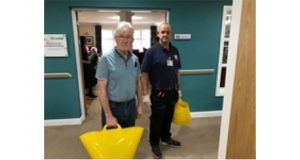Work Experiences For Residents With Dementia
 Feeling frustrated, helpless and unsure of themselves, a person in the mid to late stages of dementia can withdraw from everyday situations, but at Eachstep Blackburn, residents are encouraged to utilise their skills and are offered paid employment opportunities to engage their interests.
Feeling frustrated, helpless and unsure of themselves, a person in the mid to late stages of dementia can withdraw from everyday situations, but at Eachstep Blackburn, residents are encouraged to utilise their skills and are offered paid employment opportunities to engage their interests.
EachStep resident Arthur, who is 75-years-old and has a diagnosis of dementia, was as an engineer throughout his working life. Ordinarily he enjoys traditional activities such as music, dancing and spending time with his family and friends, but he is also able to reconnect with the skills that he spent many years perfecting through paid DIY and gardening work.
“It is important to bring people’s life history into how you support them,” said Phil Benson, manager of EachStep Blackburn. “Arthur values using his skills to help the maintenance team.
“His confidence has grown over the weeks and he is able to help Paul, our facilities officer, to carry out the various DIY tasks that need completing on a weekly basis, such as checking the temperatures of the care home’s water outlets and maintaining the gardens.”
According to the College of Occupational Therapists, care homes must ensure that residents with a diagnosis of dementia are given continuous opportunities to learn, make choices and share experiences.
Similarly, in its Quality Standards on the Mental Wellbeing of Older People in Care Homes, the National Institute for Health and Care Excellence (NICE) states that older people in care homes should be enabled to maintain and develop their personal identity through a range of stimulating activities.
“Going into a care home does not mean giving up on things you value in life,” says Karin Orman, professional practice manager at the College of Occupational Therapists. “It is an opportunity to continue with the activities you enjoy, practice old skills and maintain dignity and choice in a supportive environment.
“Keeping active and occupied is crucial for people in care homes who risk serious health complications if they are left with nothing to do. People need activity, it is simply vital for a healthy body and mind.”
There is a common perception that moving into a care home involves a loss of independence and autonomy and while communal living may involve some compromise, it does not mean older people have to give up the activities they enjoy that are central to their identity.
Understanding individuals’ lives and giving them experiences that match their talents and life history has given residents at EachStep Blackburn a renewed sense of purpose, enabling them to contribute to their home using their knowledge, skills and expertise.
Not one to rest on her laurels, sixty-four-year-old Susan has taken up paid work at the care home. Although she developed dementia at a young age, Susan has always been keen to remain as active and independent as possible, and since the care home opened in May, has helped with various housekeeping duties.
Susan, who says that “work is one of the things that makes me feel well again,” has also expanded her skills set and regularly helps the administration team at the home. Most recently, she was given the opportunity to purchase Blackburn Rovers season tickets for the care home’s residents.
“Keeping people active and engaged is the cornerstone of providing great support to people living with dementia,” said Mr Benson. “By enabling people to do the things that they love, they lead fuller, happier lives. This is our philosophy at EachStep Blackburn and one that we apply every day.
“We work hard to understand what matters most to the people we support, what people like and how best to support them. By understanding this, we can focus on people’s passions and interests and are able to encourage people to stay connected with ‘who they are’ and to use their skills to do the things they are good at.
“My message to all care homes is to think beyond traditional activities. The people you support will have talents, passions and interests that they have enjoyed throughout their lifetimes and when you can find creative ways to keep them connected, that’s when the magic happens.”






